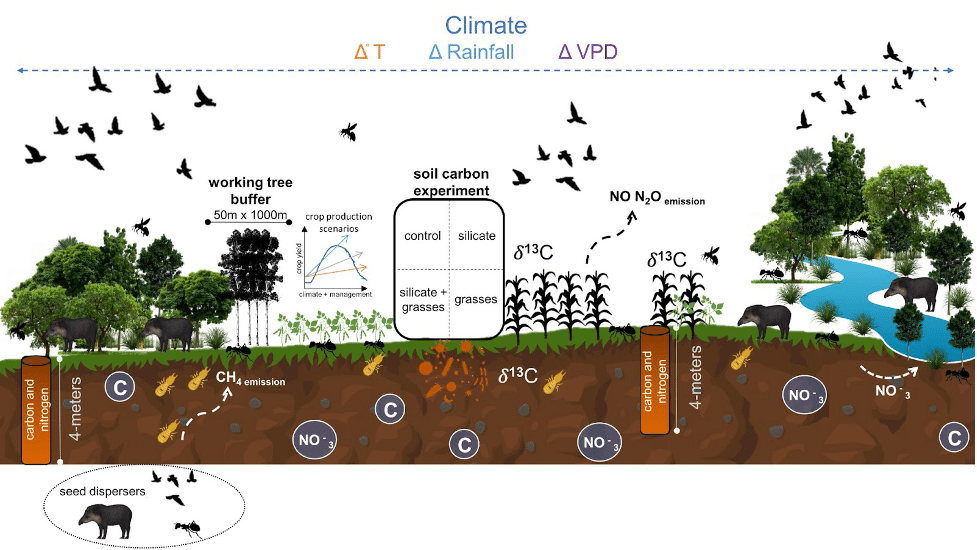photo by Paulo Brando
- Ludmila Rattis Assistant Scientist, Tanguro Field Station General Coordinator
- Michael T. Coe Tropics Program Director, Senior Scientist
- Marcia N. Macedo Water Program Director, Senior Scientist
- Linda A. Deegan Senior Scientist
- Christopher Neill Senior Scientist
- Jonathan Sanderman Carbon Program Director, Senior Scientist
- Wayne S. Walker Chief Scientific Officer, Senior Scientist
- José Lucas Safanelli Research Scientist
- Abra Atwood Postdoctoral Researcher
- Zoë Dietrich Research Assistant
- Matthew Jacques Research Assistant
- Lucas Paolucci Assistant Professor, Federal University of Viçosa
- Arthur Bispo Assistant Professor, Federal University of Goiás
- Leandro Brasil Assistant Professor, Federal University of Mato Grosso
To keep feeding a growing world, we must ensure the long-term viability of agricultural production.
The future of agricultural production depends on a healthy environment and stable climate. However, regional and global climate changes are threatening major agricultural systems in the tropics.
Our Work
Global Assessment from Local Observations (GALO) conducts research at farms in Brazil’s agricultural frontier to explore the intricate dynamics of agriculture and the environment. Our focus on the intricate relationships between standing forests, climate stability, and carbon-rich landscapes will help to establish a foundation for regenerative agriculture in the broader Cerrado and Amazonia regions.
Our research prioritizes four key areas, and seeks to understand and leverage the connections between them:
- Climate regulation
- Water quality and availability
- Reducing carbon emissions while increasing carbon sequestration
- Protecting biodiversity
Working at the intersection of basic science and on-the-ground, farm-level work, our teams at Woodwell Climate and IPAM Amazônia are co-creating solutions for agriculture. We generate knowledge by collaborating with partners including Yale University, the Max Planck Institute for Biogeochemistry, the Federal University of Goiás, the Federal University of Mato Grosso, and the Federal University of Viçosa. Much of this project’s research takes place at Tanguro Field Station, a working agricultural farm at the Amazonian agricultural frontier in Mato Grosso, Brazil.
Our field partners encompass an expanding network of private companies and individual producers who generously grant us access to their lands. We conduct extensive sampling of water, biodiversity, and above- and below-ground carbon throughout Brazil in farm fields, forests, and the “buffer zones” in between. This groundwork sets the stage for future work in other tropical regions as we continuously strive to advance agricultural sustainability worldwide.
Research area

Graphic by Ludmila Rattis – GALO aims to explore the intricate dynamics of agriculture and the environment through several key objectives, illustrated above. We are investigating the climate-land-use relationship, measuring water quality and usage in agronomic systems, quantifying feedback on crop yields and soil carbon storage, assessing carbon storage in forest edges, studying agricultural management’s impact on ecosystems, and understanding the origins of nitrate buildup in deep soil.
Impact
Through our collaborative efforts with esteemed institutions and on-the-ground partners, we are leading transformative strides in agricultural sustainability. Our extensive research and sampling across Brazil is contributing to the development of innovative, climate-resilient management techniques that mitigate the effects of climate change while enhancing agricultural productivity.
We are also assessing economic and social costs and benefits, which provides invaluable insights into agricultural techniques’ viability and feasibility, and ensures their practicality for farmers and communities. With this information, we are identifying adoption pathways and recommending policy frameworks to facilitate the widespread implementation of climate-resilient practices, laying the groundwork for a more sustainable future in Brazil and tropical regions worldwide.
This work is supported by Bayer, National Science Foundation–Biodiversity on a Changing Planet, São Paulo Research Foundation, Woodwell Climate’s Fund for Climate Solutions, and NASA.



